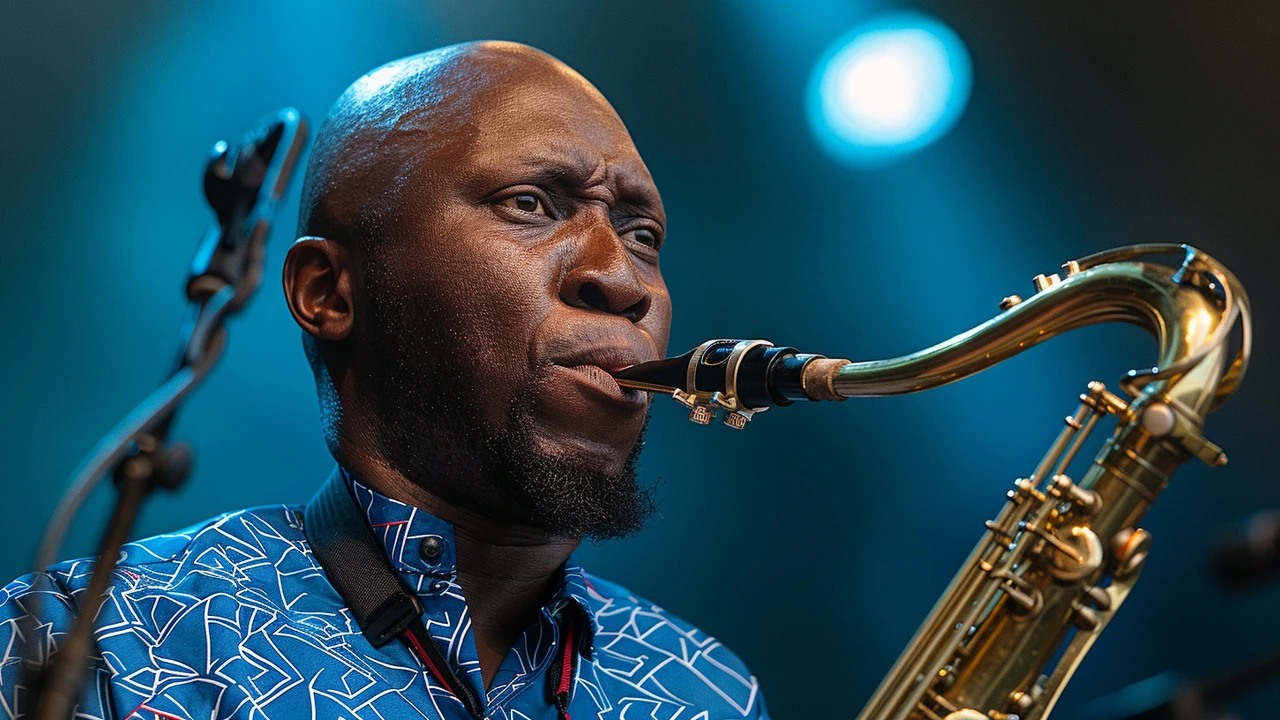
Seun Kuti Criticizes Iyabo Ojo for Politicizing Mohbad's Death in Battle Against Naira Marley
In a recent and highly-charged video message posted on his Instagram account, Afrobeat singer Seun Kuti has accused Nollywood actress Iyabo Ojo of politicizing the tragic death of Nigerian singer Mohbad. Kuti suggests that Ojo is using the unfortunate event as a tool in her campaign against Naira Marley, who is Mohbad's former record label boss. This revelation has sparked a significant controversy, drawing attention to the motives and actions of Nigerian celebrities in the wake of tragic events.
Questioning Motives: Justice or Agenda?
Seun Kuti, known for his outspoken nature, did not hold back in his critique. He responded to Iyabo Ojo's claims that he, Kuti, is confusing the youth by asserting that controversial social media activist 'VeryDarkMan' is a necessity. Kuti's argument is rooted in what he perceives as Ojo's disingenuous activism. He openly questioned whether Ojo's intentions were genuinely about seeking justice for Mohbad, or if she was merely targeting Naira Marley for personal or political reasons. Kuti's critique opens a broader discussion about the authenticity and motivation behind celebrity activism.

Government Findings and Hypocrisy
Kuti further pried into the matter by asking if Iyabo Ojo accepted the Nigerian government's findings that Mohbad’s death was linked to substance abuse. This question aims to highlight a perceived inconsistency in Ojo's stance. Moreover, Kuti went on to criticize the lack of a unified movement against confraternities in Nigeria, organizations often linked to violence and criminal activities. By raising these points, Kuti calls out what he sees as selective activism that conveniently ignores broader societal issues in favor of targeting specific individuals.
Friends with the 'Enemy'
Amid his accusations, Kuti pointed out the hypocrisy of celebrities who purport to fight against bullying in society while maintaining close relationships with known cultists and bullies. This duality, according to Kuti, undermines the authenticity of their activism. Through this lens, Kuti encourages a deeper introspection among celebrities and public figures about their roles and responsibilities in society, especially when it comes to genuine advocacy versus performative activism.
The Role of Social Media
Seun Kuti’s video message is a reflection of the significant role social media plays in modern activism and public discourse. Platforms like Instagram and Twitter have become battlegrounds where public figures express their views and influence public opinion. Kuti’s use of Instagram to voice his accusations underscores the power of social media as a tool for unfiltered and immediate communication. However, it also brings to light the challenges of discerning genuine advocacy from opportunistic actions.
Impact on Followers
The controversy between Seun Kuti and Iyabo Ojo is not just a clash of personal viewpoints; it has a ripple effect on their followers and the broader public. Celebrity opinions often shape public discourse, especially on sensitive issues like the death of a young and talented artist. Mohbad’s death has already stirred emotions across Nigeria, and the added layer of this high-profile disagreement further complicates the narrative.

The Need for Unified Efforts
Kuti's allegations also serve as a call for more unified and genuine efforts in addressing societal issues such as substance abuse, confraternity violence, and bullying. Rather than isolating the blame or targeting individuals, Kuti’s critique suggests the need for a collective approach in fostering real change. This involves public figures using their platforms responsibly and authentically to bring about positive societal transformation.
Conclusion
The tension between Seun Kuti and Iyabo Ojo over the death of Mohbad and its aftermath reflects deeper issues within Nigerian society and its celebrity culture. As public figures continue to leverage their platforms to address societal concerns, the authenticity and intention behind their actions remain crucial. Seun Kuti's criticism of Iyabo Ojo is a reminder that in the court of public opinion, the truth often lies beneath the surface, and genuine advocacy should always be questioned and scrutinized for its true intent and impact.
- tags : Seun Kuti Iyabo Ojo Mohbad Naira Marley
18 Comments
Sara Lohmaier July 2, 2024 AT 03:08
This whole thing is just performative outrage dressed up as justice. Nobody cares about Mohbad-they care about the drama.
Sara Lohmaier July 3, 2024 AT 16:02
Iyabo Ojo? Please. She’s been chasing relevance since her last movie flopped. Seun? He’s got the moral high ground, but he’s also too busy preaching to the choir to fix anything real. The real villain? The system that lets a young man die from neglect and then turns his corpse into a hashtag.
Sara Lohmaier July 4, 2024 AT 21:38
This is a classic Western narrative imposed on African tragedy. Mohbad’s death is not a reality TV plotline. It is a symptom of a broken society that glorifies chaos and silences truth. The Nigerian state must act, not celebrities with Instagram accounts.
Sara Lohmaier July 6, 2024 AT 05:44
Look, I get why people are upset. Mohbad was talented, young, and gone too soon. But when you turn grief into a weapon against another artist, you’re not advocating-you’re weaponizing. Seun’s point about selective outrage is valid. Where was this energy when confraternities were killing students? Where was it when police brutality went unchecked? It’s easier to target a rapper than to demand systemic change.
Sara Lohmaier July 8, 2024 AT 04:56
I think it’s important to separate the person from the platform. Mohbad’s death is tragic, and yes, people are using it to push agendas. But maybe that’s also how change starts? Even if it’s messy. I just hope someone’s actually helping the kids who are still struggling with the same pressures that led to this.
Sara Lohmaier July 9, 2024 AT 07:08
Iyabo Ojo is a fraud. She doesn’t care about justice-she cares about being seen as the ‘voice of the people.’ Meanwhile, she’s probably sipping champagne in Lekki while pretending to cry over a dead rapper. Seun called it out. And honestly? I’m tired of celebrities who treat death like a PR opportunity.
Sara Lohmaier July 10, 2024 AT 08:07
The structural analysis here is underdeveloped. The performative activism exhibited by public figures like Ojo reflects a broader pathological shift in postcolonial cultural capital, wherein symbolic capital is commodified via digital visibility protocols. Kuti’s intervention, while rhetorically potent, lacks institutional grounding. One cannot dismantle systemic pathology through viral outrage alone.
Sara Lohmaier July 10, 2024 AT 08:12
Iyabo is a saint compared to Naira Marley who’s probly still laughing in his mansion with his gold teeth. Mohbad was a baby and they let him die like trash. Seun? He’s just mad because he’s not getting enough clout. Everyone’s fake. Everyone’s lying. I’m so tired of this.
Sara Lohmaier July 12, 2024 AT 03:03
The irony is thick enough to spread on toast. Kuti, a man who’s never met a protest he didn’t like, is now lecturing about authenticity? Please. The real hypocrisy? That the same people screaming about ‘confraternities’ and ‘substance abuse’ never once called for rehab programs or youth centers. They just want someone to blame.
Sara Lohmaier July 13, 2024 AT 16:13
Let’s be real-this isn’t about Mohbad. It’s about power. Naira Marley’s label controls the airwaves. Iyabo Ojo’s got a Netflix deal in the works. Seun Kuti’s got a Grammy nomination on the horizon. Everyone’s playing chess with a dead man’s name. The fact that you’re even debating this means you’ve already lost. The system wins. Again.
Sara Lohmaier July 14, 2024 AT 21:08
The grammar in Ojo’s original statement was atrocious-subject-verb agreement errors, dangling modifiers, and a complete lack of parallel structure. That alone undermines her credibility. Kuti’s critique, while emotionally charged, is rhetorically superior. The real issue? The public confuses eloquence with truth. They don’t fact-check-they feel.
Sara Lohmaier July 15, 2024 AT 02:02
This is the same pattern we’ve seen since Fela. When a young Black artist dies, the intelligentsia swoops in to moralize while the actual problems-poverty, education, mental health-remain untouched. Kuti’s right to call out the hypocrisy, but he’s still part of the same elite that benefits from the spectacle. Real change doesn’t happen in Instagram comments.
Sara Lohmaier July 15, 2024 AT 14:24
You think this is about Mohbad? Nah. This is a psyop. The government paid Iyabo to stir the pot so they could distract from the election rigging. Naira Marley’s label is owned by a shell company linked to the DSS. Seun? He’s being used as a pawn. They’re all pawns. The real truth? Mohbad was silenced because he knew too much.
Sara Lohmaier July 17, 2024 AT 02:06
The cultural context here is essential. In Nigeria, grief is often expressed through public spectacle-it’s not performative, it’s communal. Kuti’s critique misses the point: Ojo’s outrage isn’t about Naira Marley. It’s about the silence surrounding youth mortality in the music industry. The system doesn’t protect artists. It consumes them. Calling it ‘performative’ ignores the lived reality of thousands who’ve lost someone to the same rot.
Sara Lohmaier July 18, 2024 AT 22:46
The issue isn’t whether Ojo is genuine or not. It’s that the Nigerian public has been conditioned to believe that only celebrities can speak truth to power. Meanwhile, grassroots organizers, counselors, and youth workers are ignored. The real tragedy isn’t the feud-it’s that we’ve outsourced our moral responsibility to people who get paid for their outrage.
Sara Lohmaier July 20, 2024 AT 07:54
This isn’t activism. This is cultural warfare disguised as mourning. The Nigerian elite don’t want change-they want control. Kuti’s got the right message, but he’s still singing to the choir. Meanwhile, the streets are full of kids who don’t know who Mohbad is, but they know who Naira Marley is. And they’re scared. Nobody’s talking about that.
Sara Lohmaier July 21, 2024 AT 03:40
I appreciate the passion, but let’s not confuse moral clarity with performative virtue signaling. True advocacy requires policy, not posts. If we want to honor Mohbad, let’s fund mental health programs in Lagos schools, not argue about who’s more righteous on Twitter.
Sara Lohmaier July 22, 2024 AT 06:06
Exactly. The moment we start measuring activism by likes and retweets, we’ve already lost. The real work happens in community centers, not comment sections. I’ve seen teachers in Ibadan holding grief circles for kids who lost friends to violence. They don’t have 100K followers. But they’re the ones keeping the culture alive.